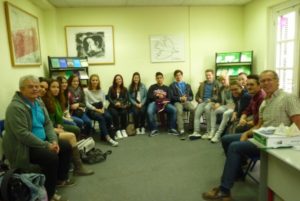From PAST to PRESENT- From MEMORY to ACTION
Para que serve a Memória da História?
Os cerca de 200 Sítios de Consciência olham para o passado, mas servem o futuro. JUNTE-SE a este movimento HOJE, pois juntos lembramos ao mundo que justiça, igualdade e direitos humanos para todos não são negociáveis, trabalhando para transformar a memória do passado em ação no presente.
A Coligação de Internacional de Sítios de Consciência é a única rede global de locais históricos, museus e iniciativas de memorial que ligam as lutas do passado com os movimentos de direitos humanos e justiça social de hoje.
Esta rede de pessoas, Sítios e iniciativas que ativam o poder dos lugares de memória para engajar o público na conexão do passado e do presente, a fim de precaver e moldar um futuro mais justo e humano.”
Quem não conhece o passado está sujeito a repeti-lo.
https://www.sitesofconscience.org/pt/sobre-nos/
https://www.facebook.com/SitesofConscience
 VER Gernika Gogoratuz é um Centro de Pesquisa para a Paz (Spain)
VER Gernika Gogoratuz é um Centro de Pesquisa para a Paz (Spain)
Gernika Gogoratuz é um Centro de Pesquisa para a Paz criada em 1987, por decisão unânime do Parlamento Basco , coincidindo com o 50 º aniversário do bombardeio de Guernica
Gernika Gogoratuz es un Centro de Investigación por la Paz (España)
Gernika Gogoratuz es un Centro de Investigación por la Paz creado en 1987 por decisión unánime del parlamento vasco, coincidiendo con el 50 aniversario del bombardeo de Gernika. El Centro realiza actividades de fomento de la paz en las áreas de investigación, capacitación, difusión de información y participación cívica con el fin de fortalecer las redes de fomento de la paz y hacer Gernika una referencia global sobre la paz. El Centro de Investigación de la Paz es apoyado por la Fundación Gernika Gogoratuz, que consiste de la municipalidad de Gernika-Lumo, las ramas de la Cultura del Gobierno Vasco, Justicia, Educación, Universidades e Investigación, la Universidad del País Vasco, Universidad de Deusto, la Universidad de Mondragón y la Asociación Gernika Gogoratuz, la cual gestiona las actividades del Centro y garantiza su independencia.
48300 Gernika-Lumo BI Spain
















